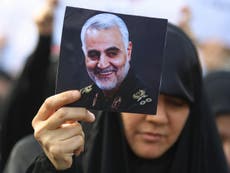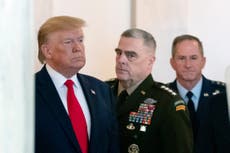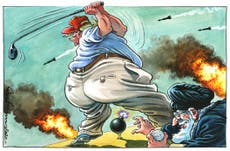The Independent's journalism is supported by our readers. When you purchase through links on our site, we may earn commission.
As a doctor, I see the human cost of America's sanctions on Iran – and it can be as great as war
Sanctions usually have built-in humanitarian exemptions – yet America’s on Iran have rendered such exemptions meaningless

The current Iranian-American conflict is complex. Even geopolitical experts have found themselves unable to predict the next move after the assassination of Qassem Soleimani, the head of the Iranian intelligence service, by the United States. Soleimani was the second most powerful person in Iran after supreme leader Ayatollah Khamenei. Retaliation is expected; resolution is not.
Trump, in pubertal Twitter bursts, has oscillated between all-out war with Iran or harsher economic sanctions. Many in the international community advocate for increased sanctions in an understandable bid to avoid war. From a humanitarian perspective, this is much preferable. Theoretically, sanctions harm economies, not citizens. Yet the evidence suggests this is not the case.
Modern diplomatic sanctions usually have built-in humanitarian exemptions, allowing international organisations to provide medical aid, food, water and education. However, America’s imposition of so-called “secondary sanctions” on Iran have rendered such exemptions meaningless.
Whereas America’s primary sanctions on Iran apply to activities that have clear links with the country – for example, transactions by US citizens or companies – its secondary sanctions apply to the activities of non-US organisations. This includes organisations without any ties to the US, who conduct financial or commercial transactions with Iran.
The effect, intentional or unintentional, of these secondary sanctions has been to deter international banks, pharmaceutical companies, NGOs and charities from facilitating the flow of goods and money to Iran, for fear or triggering US sanctions against themselves – provoking what Human Rights Watch (HRW) calls “overcompliance”.
The humanitarian effects have been dire: HRW has reported that the current sanctions on Iran are restricting access to basic healthcare services and life-saving medication.
A recent UN envoy stated that they were “not only concerned that sanctions and banking restrictions will unduly affect food security and the availability and distribution of medicines, pharmaceutical equipment and supplies, but […] also concerned at their potential negative impact on the United Nations and other operations and programmes in the country.”
Similar sanctions imposed by the US on Iraq during the 1990s suggest the envoy’s concerns are well-founded. The New York Times reported that up to 576,000 children died in the four-year period following the Persian Gulf War, during which military action ended and UN economic sanctions commenced. Meanwhile, the Red Cross reported in 1999 that “infant mortality in most of Iraq has more than doubled” during the nine years of sanctions, and that “one million people in Iraq were suffering from the effects of food shortages and poor water supply, including 200,000 acutely malnourished children”. Of course, sanctions are not the sole reason for such alarming statistics – the Iraq war itself caused long-term healthcare ramifications – but the World Health Organisation was adamant that they played a substantial role.
Diplomatic action is often nobler than war. Yet it is important to note the human rights burden and number of deaths caused by sanctions is a quietly brutal public health tragedy.
This does not have to be the case. America’s recent amendments to sanctions on Venezuela have emphatically stated that Venezuelan banks aiding the flow of humanitarian support to the country would not be penalised. While squeezing a country’s economy is bound to have some humanitarian effect, the impact of sanctions can be mitigated. Those of us with the who have elected politicians to make decisions regarding war and peace must hold them to account to ensure it is.
Salil Patel is an academic junior doctor at Imperial College, London and a neuroscience research fellow at the University of Oxford.





Join our commenting forum
Join thought-provoking conversations, follow other Independent readers and see their replies